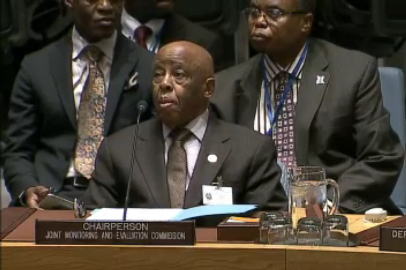JMEC chairman briefs UNSC on implementation of South Sudan peace agreement
March 31, 2016 (NEW YORK) – The United Nations Security Council (UNSC) has been briefed by the Chairman of the Joint Monitoring and Evaluation Commission (JMEC) on the steps taken and challenges faced in the implementation of the peace agreement signed by the warring parties in South Sudanese conflict in August 2015.

‘Thank you for the opportunity to again address the Security Council. Following my last briefing to the Council on 19 February, I must unfortunately report that implementation of most aspects of the agreement continues to be delayed,” Mogae told the UNSC.
President Salva Kiir and his rival, Riek Machar, who leads the armed opposition, SPLM-IO, signed the agreement in August last year, but a transitional government is yet to be formed.
Mogae, however, told the Council that with the ongoing arrival to Juba of the 1,370 armed opposition (SPLM-IO) forces to be completed next week, Machar was likely to return and the long-awaited transitional government can be formed in mid-April.
“In response to the plan for transitional security arrangements for Juba, the capital, which I issued on 23 February in my capacity as Chairperson of the Joint Monitoring and Evaluation Commission, the first of the 1,370 troops of the SPLA ln Opposition have now returned, by a combination of United Nations and charter aircraft,” he said.
“Flights are planned to continue over the coming week, until the full complement of 1,370 has been transported. Following the arrival of these forces, the First Vice President designate, representing the SPLM ( ln Opposition), has assured us that he will return to Juba, thus permitting the formation of the new government,” he said in a statement read to the UNSC.
The former President of Botswana also cited a number of ceasefire violations which he said took place in Upper Nile, Bhar el Ghazal and Equatoria regions, although he did not name the parties responsible for the violations.
He also told the Council that, according to his observation, the act of “formation of the new government will not automatically relieve the humanitarian, developmental, political, military and economic crisis that the country continues to face.”
Mogae further called on the parties to begin to seriously work on implementing reforms in various sectors, particularly on the economy, as provided for in the peace agreement, adding that the new government should not be another destabilizing factor.
“…I am cautiously optimistic that the new transitional government will be in place by the middle of next month…That said, the Parties can do more to prepare for the return of the First Vice President-designate to Juba and ensure that the formation of the new government is not itself destabilizing,” he told the Council.
There are fears that with the opposition to the peace agreement by elements from both sides, the would-be transitional government will be characterized by continued confrontations between rival parties in their deliberations.
Observers say issue to do with the future of the states in South Sudan is one of the obstacles to smooth implementation of the peace agreement.
The head of JMEC also told the Council that there was need for the parties to the peace deal to abide by the IGAD communiqué which called on the government to suspend the 28 states it unilaterally created and for the parties to establish a boundary commission to agree on number of states and their boundaries or revert to the 10 states of the country.
“The Parties must also soon turn their attention to resolution of the state’s internal administrative boundaries. The IGAD communiqué of 31 January, later endorsed by JMEC, outlines the formation of a new, ad-hoc National Boundary Commission to review the number of states and their boundaries. It is critical that this Commission be quickly established to address the issue, and prevent any further destabilization.”
Given the disagreements between the parties on the future of the states, observers also say the country may instead soon revert to 10 states.
CIVILIANS AT RISK
Meanwhile, senior UN officials said the humanitarian and human rights situation in South Sudan remains dire, and asked the Security Council to call on the parties to the conflict and armed actors to uphold their obligations under international law to protect civilians and aid workers, and grant free access for delivery of life-saving supplies.
“The challenge in South Sudan is an increasing disconnect between the assurances of national and the actions of local groups,” said UN Under-Secretary-General for Humanitarian Affairs and Emergency Relief Coordination, Stephen O’Brien.
The official decried the continued targeting of civilians in South Sudan by the parties involved in the conflict and lack of access by humanitarian agencies to those in need.
More than 17 obstruction cases, O’Brien said, have been reported in South Sudan, despite a Presidential Statement on 17 March, in which the Council urged the Government of South Sudan and the Sudan People’s Liberation Movement in Opposition (SPLM-IO) to allow people to move freely and aid to get to those in need.
According to the senior UN official, aid workers and humanitarian supplies are targeted, with at least two worked killed since December 2013, and a conservative estimate of humanitarian losses since the beginning of this year of around $10 million.
He however said the world body and its partners were able to reach more than 4.5 million people with assistance, often in the most remote areas, despite the obstacles.
(ST)
